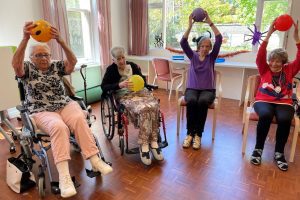How Can You Help Someone With Muscular Dystrophy?

Earlier we discussed the most frequently asked questions about muscular dystrophy here.
What is Muscular Dystrophy?
Muscular Dystrophy is a hereditary disease caused by alterations in the genes responsible for healthy muscle structure and function. These alterations mean that the cells that should maintain your muscles can no longer fulfil this role, leading to muscle weakness.
What Happens After Diagnosis?
There are many variations of muscular dystrophy (known as MD), and because there is no known cure, it may be difficult to understand for both you and your loved ones. It is at this point we’re seeking a medical professional with experience in dealing with MD, like Four Oaks Healthcare will help you understand your diagnosis and the level of care that you may require to suit your needs.
How To Help Someone With MD
As MD is a progressive disease, as such any individual journey may not be the same and some aspects of the condition require different levels of care at any given time.
Here are some options that may be useful:
Emotional Support
Due to the nature of muscular dystrophy, it may become difficult to perform daily activities that they have been used to doing for a very long time without any support. The need to have someone else assist or do these tasks for you may have a high emotional impact, therefore it is necessary that the patient’s emotional needs are monitored and taken care of through reaching out to counsellors or support groups.
Medication
While this may not be helpful to everyone if diagnosed as a child, a prescription of corticosteroid Prednisone to help slow the rate of muscle. For any advice regarding this medication be sure to consult with your medical professional to make sure that you are fully aware of all the side effects associated with using this medication.
Physical Therapy
Physical therapy done in moderation can help to maintain muscle tone and reduce the severity of joint contractures with exercises that help keep the muscles strong and the joints flexible.
Bracing may also be used to help support the muscles by a physical therapist, this is to help prevent or manage joint contractures, which is a stiffening of the muscles near the joints that can make it harder to move and can lock the joints in painful positions.
Spinal Fusion
Many people who have the Duchenne and Becker forms of Muscular Dystrophy can develop severe scoliosis – an S- or C-shaped curvature of the spine that develops when the back muscles are too weak to hold the spine erect. Some children who have severe cases of scoliosis can undergo spinal fusion. This surgery can reduce pain, lessen the severity of the spine curvature which helps with sitting upright and comfortably in a chair and reduces spine curvature that can affect individual breathing.
Respiratory Care
Many individuals with Muscular Dystrophy also have weakened heart and respiratory muscles. As a result, they can’t cough out phlegm and sometimes develop respiratory infections that can quickly become serious. Good general health care and regular vaccinations are especially important for children with Muscular Dystrophy to help prevent these infections.
Assistive Devices
Due to continuous technological advancements and developments, they are devices available to sustain independence and mobility for people living with Muscular Dystrophy.
A child with Duchenne Muscular Dystrophy may use a manual wheelchair when it becomes too difficult to walk. Another option would be a power wheelchair, which can be equipped to meet an individual’s needs as muscle deterioration progress, is often used.
Another example is voice-activated software on computers that help to assist with social interaction and schooling possibilities for individuals with affected mobility and hand control.
At Four Oaks Healthcare, our approach to caring for clients with Muscular Dystrophy is the same as our approach to everyone that we care for. We aim to enable and empower our clients to feel as independent as possible and to never feel isolated by their condition.
If you need anything else, from advice to a care assessment, get in touch and an experienced member of the team will be happy to help.




